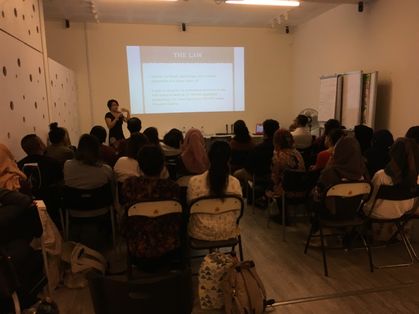-
Advocacy Theme
-
Tags
- Abortion
- Adoption
- Caregiving
- CEDAW
- Disability
- Domestic Violence
- Domestic Workers
- Harassment
- Healthcare
- Housing
- International/Regional Work
- Maintenance
- Media
- Migrant Spouses
- Migrant Workers
- Muslim Law
- National budget
- Parental Leave
- Parenthood
- Polygamy
- Population
- Race and religion
- Sexual Violence
- Sexuality Education
- Single Parents
- Social Support
- Sterilisation
- Women's Charter
Ramadan Talk with Women and Law in Islam (WALI): Violence in Muslim Marital Homes – What is to be done?
June 13th, 2018 | Gender-based Violence, Muslim Women's Rights, News
By Shafeeqah Ahmad Rosli, AWARE intern
On 31 May 2018, Women and Law in Islam (WALI) held their Ramadan Talk at AWARE centre. WALI is a grantee of AWARE’s Power Fund. The topic of discussion was: Violence in Muslim Marital Homes – What is to be done? We were joined by panellists Zaharah Ariff, centre head of Casa Raudha, a temporary refuge centre for survivors of domestic violence, and Jolene Tan, policy advisor for AWARE.
Jolene started the ball rolling with a stark reminder that Singapore’s law exempts a man from being charged with rape, or the offence of sexual penetration of a minor, if he carries out this act against his wife. Under the Singapore Penal Code, the definition of rape does not extend to within a marriage, unless the woman is under 13 years of age. Jolene further explained that there have been many attempts to repeal this law – from calls during the 2007 Penal Code review, to a 2009 media and online campaign which she helped to spearhead, as well as more recent work by AWARE at the Universal Periodic Review and CEDAW. However, to this day, the law has introduced only minor exceptions to the defence, mostly in situations where formal steps have been taken to dissolve the marriage or obtain court orders. She later said that to properly reform the law, we should consider “rape as a crime against a human, and not a crime against an abstract quality”, referring to society’s attitude that a woman’s modesty is being harmed in rape cases rather than the woman herself.
Zaharah then took the floor and shared some of the cases that have falsely attributed domestic violence to religion. From her experience in working with survivors of domestic violence, she noted that some of the perpetrators waywardly used religion as a justification of their violence against their partners. The women who enter the shelter do not question the validity of their husbands’ violent claims due to the lack of their Islamic knowledge. “As long as the husband uses the word religion, that’s the truth to [the women],” she said.
Zaharah then shared that at Casa Raudha, they empower women by educating them of their rights as wife in Islam, so that they can understand that Islam does not condone domestic violence. She therefore highlights the importance of professionals working with Muslim survivors of domestic violence to be equipped with some basic knowledge of Islam as well. In this way, they would be able to communicate more meaningfully about the religion’s true stance on domestic violence.
Other than repealing the law on marital rape, providing women who have suffered domestic violence a safe space, and equipping them with skills to protect themselves – what else is there to be done on violence in Muslim marital life?
The audience shared that with regards to domestic violence at home, it is not sufficient to only work with the women who have been abused but that it is important to also engage the perpetrators, assuming they are willing, and work on dismantling the concept of toxic masculinity to end domestic violence.
Other audience members chimed in and agreed that much work is needed to be done in addressing toxic masculinity – something that was identified by the audience as being the main problem of domestic violence in marital homes. As the discussion focused on engaging the perpetrators, Jolene took the opportunity to underscore that in discussing domestic violence, it is important to accept that it is a form of gender-based violence.
Gender-based violence involves men and women, where the latter is usually the target, and is derived from unequal power relationships between men and women. This is not to say that gender-based violence against men does not exist. However, it has been widely acknowledged that the majority of persons affected by gender-based violence are women and girls, as a result of unequal distribution of power in society between women and men.
While the talk focused on violence in Muslim marital life, the panelists noted that gender-based violence is not exclusive to a particular community because the problem of gender hierarchy and concept of masculinity is prevalent in many communities – not just the Malay-Muslim community. The audience walked away from the talk with more legal knowledge on rape and domestic violence, and with the reassurance that there are organisations such as AWARE and Casa Raudha that are committed to helping survivors of domestic violence.
—
About WALI:
Women And Law in Islam (WALI) is a group that promotes gender equality in Islam through conversation, public awareness and debate.




